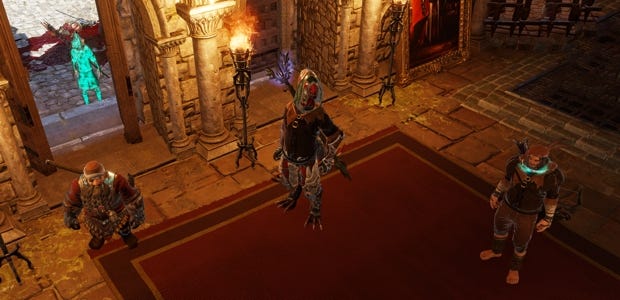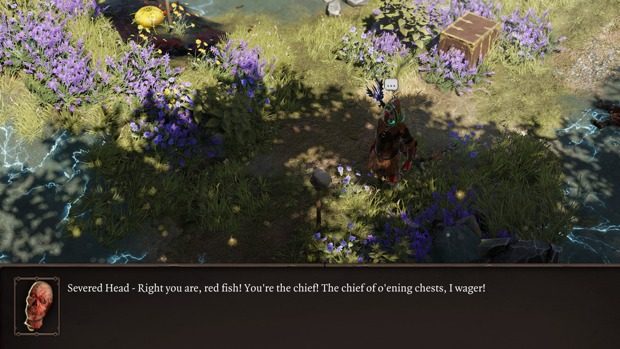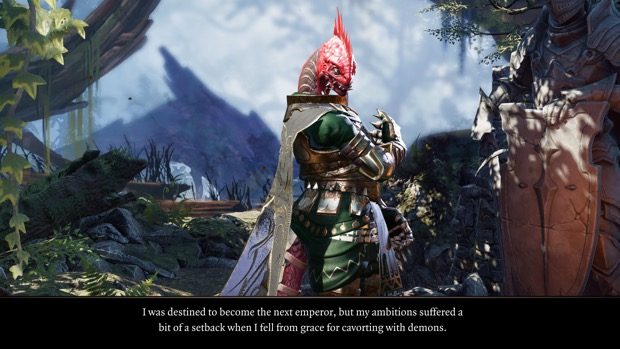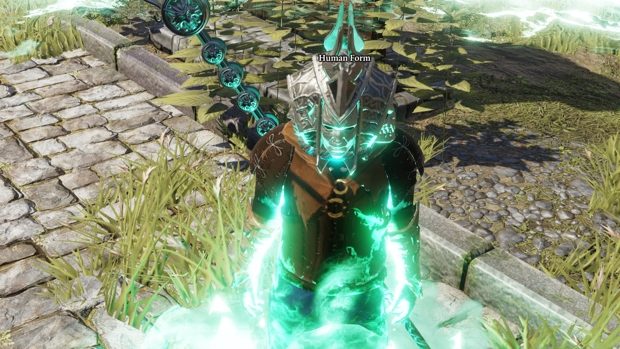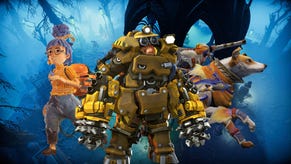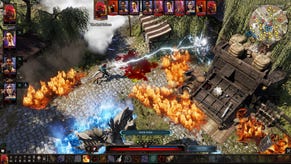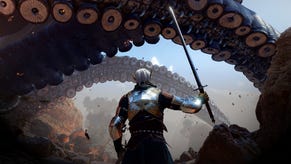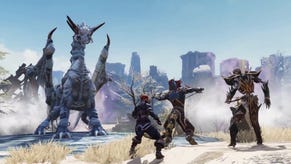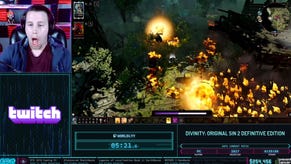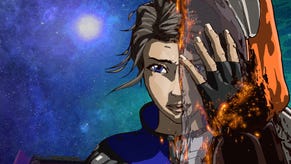How multiplayer makes Divinity: Original Sin 2's singleplayer great
It's all about freedom
This is The Mechanic, where Alex Wiltshire invites developers to discuss the inner workings of their games. This time, Divinity: Original Sin 2 [official site].
It’s the holy grail for RPGs, right, that perfect mix of a strong story and freedom to do what you want. But if players can do anything, how do you tell them a story in the right order and without bits missing? What if they kill some plot-important character or sell the magical thing that does the special thing?
Quite a few RPGs do a good job! Planescape: Torment, for one, presents a fantastically dense and interwoven set of characters and scenarios which you can approach in many different ways. But Divinity: Original Sin 2 goes a step beyond, telling a clear story and allowing - even encouraging - you to do all kinds of dumb things, all without completely breaking. How does it succeed? Well, through a feature that you’d never think is related.
THE MECHANIC: Multiplayer
Very mild spoilers follow, but nothing actually spoiling, promise.
When you think about it, it makes a lot of sense. If you give players room to do what they like together, you can also give lone players the same thing. “The singleplayer is much stronger because of the multiplayer,” Swen Vincke, head of developer Larian Studios, tells me. “It enforces more freedom.”
DOS2 has many features that simply wouldn’t exist if it didn’t incorporate multiplayer, simply because - in Vincke’s words - they’ve been so challenging to develop. The key one, though, is the ability to detach members of your four-strong party so you can direct them around the world entirely independently of each other. You can have one standing on the beach on one side of the world, another in a forest on the other, a character in a dungeon and one in the main town. You can then switch between them at will.
This feature enables connected players to occupy the same world but not be bound to the area encompassed by hosting player’s screen. It’s not a new concept, just ask Neverwinter Nights, but DOS2 develops it further. For one thing, you get all kinds of strategic options, such as positioning your party ahead of a battle. “It gives you a very strong sense of freedom, and that freedom is necessary if you want to work with multiplayer; without it the multiplayer wouldn’t be fun,” Vincke says.
And outside of battling and messing around with DOS2’s mad chemistry set, it’s also the foundation for a set of dramatic wrinkles and features, or what Vincke calls “interesting complications”, which help to bring it to roleplaying life.
Like most RPGs, DOS2 features a set of six what it calls ‘origin characters’ who you can play as and add to your party. Their backstory, motivations and aims influence the unique dialogue options you’ll be offered when you play as one of them, and when they’re companions, they can interject in certain conversations to further their own goals, if you let them. But in DOS2, your companions are independent NPCs, so you’ll only hear what they say, not hear their internal dialogue. An echo of the nature of playing with someone else, separate but together, they feel like separate beings, despite being able to direct them around the world.
So let’s say you’re playing as Lohse in singleplayer and recruit the rogue-elf Sebille, and then detach her to wander the world for a while. Sooner or later, she’ll encounter events and characters who are a part of her individual story, but since she’s not with your main character she’ll engage with them outside of the influence of your main character. “Those are what we call orphaned origin moments,” Vincke says. “We had put logic in to account for them.”
The fact that you, Lohse, can listen into their conversations is explained away through you being linked together through Source, the magical force that runs Divinity’s world. But since you’re not Sebille, you don’t have control over what she will say. For example, she might meet a lizard called Stingtail camping at a spot outside the early-game hub, Fort Joy. Thing is, she hates lizards, so much that it’s a key point in her backstory and goal, and if she talks to Stingtail, she’ll immediately kill him.
Now, Stingtail is important to the Red Prince, an aristocratic lizard and another of the origin characters, because he’s part of the Red Prince’s personal quest to reclaim his birthright. And yet, if Sebille doesn’t assassinate Stingtail, she can’t continue her own personal quest. So even as you have incredible freedom to do as you like, DOS2 is always careful to weigh consequences against it.
They don’t feel forced, though, because the consequences usually relate to the relationships between the origin characters. In another echo of multiplayer, where you can always turn on your friends because why not, you and your companions are not necessarily best friends 4 lyfe. In fact, the game continually puts you in situations where the aims of one character conflict with those of another, like those of Sebille and the Red Prince. It makes for deliciously hard decisions, with the constant chance that a character will turn on the party.
Powering this is a simple attitude system, where each character has an opinion that’s influenced by your actions. Say nice things and it’ll go up. They’ll like you even more if you let them take over a conversation, but sometimes that’ll land you in hot water. You can stop them, but that comes with the cost of them getting upset with you. Each character has an upper attitude threshold, which will lead to stronger friendships and even let you influence key decisions, and a lower one, which will cause them to hate you and leave the party.
All this freedom within flexible systems presents two sticky problems. One is kind of intractable. If you don’t play the game at least 11 times, once each for the cast of origin characters and once for each of the five races, you don’t have a chance of seeing everything in the game. For those who play to feel completion, or who feel the burning sense of missing out when they sense they’re not seeing every major plotline and revelation, DOS2’s approach to the RPG will be uncomfortable. “Those players are angry at us!” says Vincke. “That’s literally it. We understand they’re angry, but it’s impossible. It’s too complex.”
The tagging system only makes things worse. Just as various dialogue options are only available to certain origin characters, even more are only available to certain races or classes of character. Scholars, aristocrats, outlaws and dwarves all have their own things to say and will cause NPCs to react to them in certain ways. Fane the ancient skellington, for instance, has a knack of completely horrifying the non-dead, while many humans dislike lizards and dwarves. The result is that DOS2 features over a million words of dialogue, which mostly comprises responses that cater to all the different tags.
“We spend a lot of work making sure you feel the things you did had an impact on the world,” says Vincke. “That goes quite far, actually, especially when you get to the endings. Nothing in DOS2 fits in a nice tree. It’s all nodes linked and mashed into to each other so it becomes very hard to get a singular view of all the options you had. And that’s because of the way we make it. It’s deeply embedded in our design methodology. It’s cool, but that can be frustrating if you’re the type of player who wants to see everything. The best thing to do for them is to read through our design docs, but that’s not necessarily the most - ” he laughs “ - fun literature in the world.”
The second problem is the sheer number of ways that DOS2’s systems can potentially break the storyline. But DOS2 stands as evidence that this one is not intractable. On one hand, it makes it clear when you’re choosing to break things, such as by letting Sebille kill Stingtail and therefore end the Red Prince’s dream of regaining his throne.
On the other hand, it pulls various tricks to keep things ticking over. Plot-important characters can be killed off because their story payloads can be offloaded to you in other ways. The old but crude way of dealing with this is to have a diary or journal hanging around for you to find if its owner isn’t around to tell you. DOS2 isn’t above using such fallbacks, but it’s more creative, too. You can, for example, talk to their ghosts once you’ve learned a specific skill during the main quest. Or you can eat corpses. This is an innate skill of elf characters: eat a body part and they’ll remember its owner’s memories. And what’s more, Fane can use his Mask of the Shapeshifter to wear an elf’s face to become an elf and use elven abilities.
“They add extra solutions to players so they could find narrative they may have missed because they, for instance, they blew up an entire city, which is possible,” says Vincke. “We can safely say that there’s never a moment that the game completely blocks you out just because you exploited the freedom it offers.”
I have to say, once you start eating corpses it’s hard to stop, because it’s the source of even more little details and richness about this world and the people within it. And here lies the real strength behind DOS2’s blend of story and freedom: “We know if we give a tapestry that’s sufficiently dense and sufficiently broad, players will be able to pick up their own storyline, which is the most fun in an RPG anyway.” The result is choice at every turn, which is exactly what a multiplayer RPG requires. It’s rather wonderful to see that necessity benefitting singleplayer so profoundly, too.
